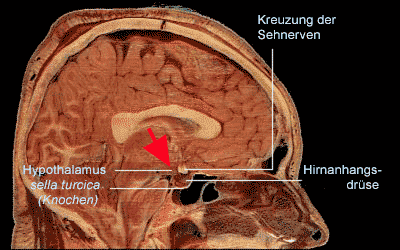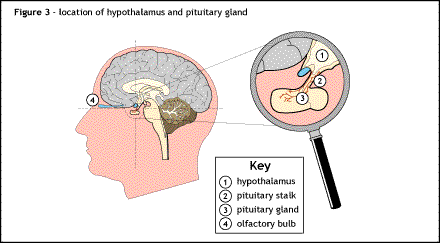While it is no bigger than a 4 g almond, the Hypothalamus located in our brain acts like a real conductor by regulating our feelings of hunger, thirst, sleepiness, body temperature, and our sex life and emotions. This post will help you better understand how an anomaly of the Hypothalamus can lead to our organism’s total deregulation.
Hypothalamus: what is it?
The term hypothalamus comes from the Greek, “hypo” meaning underneath, and “thalamus,” a cavity. It is a small area of the brain located below the thalamus (a pair of cerebral diencephalic gray matter) and above the pituitary gland. The Hypothalamus serves as a link between the autonomic nervous system and the endocrine system.
The Hypothalamus is a gland in our brain measuring a few cubic centimeters (almond size), comprising several independent nuclei; themselves made up of nerve cells.
The Hypothalamus is located near the pituitary gland, which is another brain gland whose activity it controls. A small stem called the pituitary gland connects them. This is called the hypothalamohypophyseal axis.
The Hypothalamus is a bit like the conductor of our brain. It is connected to practically all the other brain areas while receiving nervous messages from our entire body.
Following stimuli, the Hypothalamus will react by secreting two hormones: vasopressin, an antidiuretic hormone that serves to retain water in the kidneys, and oxytocin, well known to pregnant women because during childbirth, this hormone will stimulate the contractions of the uterus but also the mammary glands during breastfeeding.
Hypothalamus: what use?

The Hypothalamus is the seat of our biological clock, located in our brain, at the suprachiasmatic nuclei level. This set of nerve cells directs the body’s functions according to a twenty-four-hour rhythm.
The Hypothalamus behaves like a control tower that reacts to various stimuli received, whether hormonal, blood, nervous or microbial. These messages’ reaction produces hormones that will intervene directly in the organs concerned or on the pituitary gland, which will secrete other hormones.
As mentioned above, the Hypothalamus thus intervenes in regulating many functions such as hunger, thirst, sleep, and body temperature. Besides its essential tasks, the Hypothalamus is also involved in:
- sexual behavior;
- emotions;
- the woman’s menstrual cycle.
Linked to the pituitary gland, the hypothalamus controls and regulates it. The pituitary gland will react by secreting other hormones, which will impact other glands in the body, such as the thyroid and ovaries.
The Hypothalamus also intervenes in the vegetative nervous system to regulate the heart and respiratory rhythm, and non-voluntary body functions.
Good to know: growth hormone is controlled by a hormone secreted by the Hypothalamus (somatoliberin).
Different hypothalamus-related abnormalities
Given the many functions of the Hypothalamus on our body, an abnormality’s consequences can be varied. Among the hypothalamus abnormalities, there can be a hypothalamic syndrome due to nerve center disturbances. This can result from encephalitis (inflammation of the brain), meningitis (inflammation of the meninges, the brain’s envelopes), or head trauma.
The consequences are:
- disturbances of the sensations of thirst and hunger;
- a disruption of the internal temperature with a bad regulation;
- sleep and mood disorders;
- poor assimilation of sugars and fats, leading to weight loss or, conversely, obesity.
A tumor can occur and lead to more or less critical dysfunctions depending on its size: headaches (headaches), vision problems, neurological and psychic disorders, absence of menstruation, fatigue, obesity or anorexia, and hair loss.
Good to know: with the evolution of technical means and medical research, MRIs (Magnetic Resonance Imaging) and scanners help effectively in diagnosis. Your doctor can then prescribe hormone dosages to enhance your Hypothalamus.
Please, remember to share this post and leave your comments in the section below.


